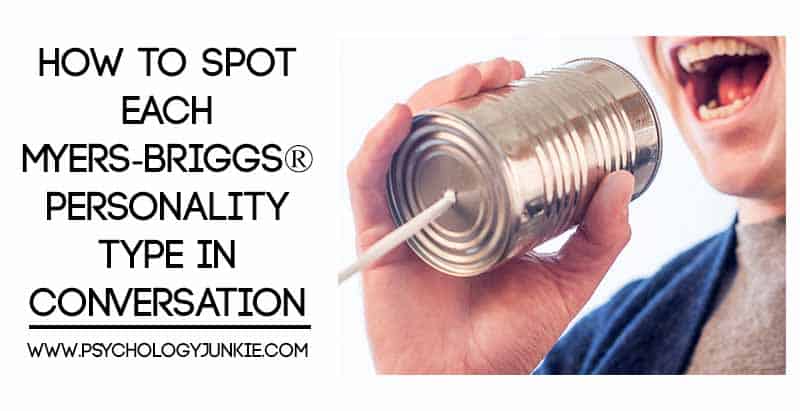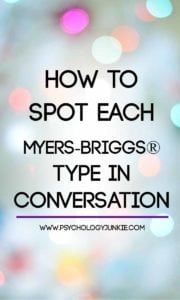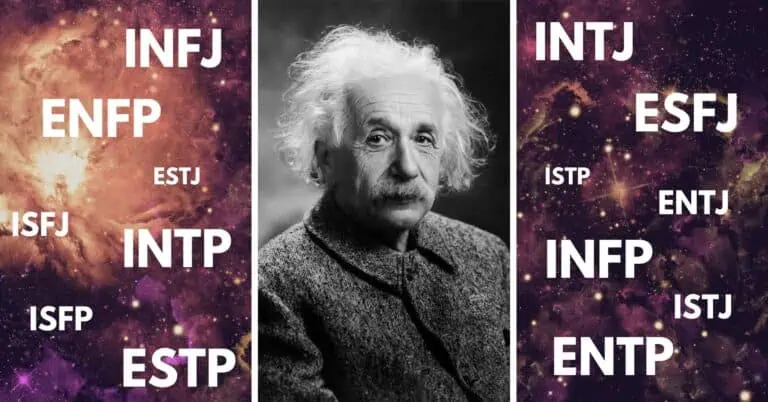How to Spot Each Myers-Briggs® Personality Type in Conversation
One of the most entertaining things you can do with your knowledge of personality theory is to try to figure out the types of your friends, family members, or even the characters you watch on TV. My husband and I often leave social gatherings ruminating about the possible personality types of the people we’ve met, or we’ll swap ideas about what types our favorite superheroes are. But when you’re meeting someone for the first time, what communication styles can reveal their personality? What cues can tip you off about whether they’re a sensor or an intuitive, thinker or feeler, judger or perceiver? Let’s take a look!
Not sure what your personality type is? Take our new personality questionnaire here. Or you can take the official MBTI® here.

How To Spot Each Myers-Briggs® Personality Type in Conversation
How to Spot an ISTJ in Conversation
ISTJs think before they speak. You’ll notice that they quietly reflect before responding. Their conversation is very sequential and you can usually follow their thought process easily because they are concerned with making sure everything is as linear and factual as possible. They will use concrete details and a lot of comparative words in their speech, such as “looks like”, “is similar to”, or “remember when”. They can easily recall past data and experiences and will pull from that to add authority to what they’re saying.
When an ISTJ speaks, their main goal is to relay facts and experiences; they’re not likely to exaggerate or add a lot of physical movement. They’re not trying to be the center of attention. In fact, they can be quite mysterious. They don’t tend to use a lot of facial expressions or body language, because the emotion related to what they are saying is all experienced internally rather than externally. Most of their feelings and reactions are very private so they can appear somewhat stoic even if they feel very strongly about something.
ISTJs tend to feel ill at ease when they’re asked to discuss their feelings or emotions. They especially dislike being asked or expected to respond emotively to something they are unprepared for. They tend to keep their feelings private and being put on the spot like this is stressful for them.
How to Spot an ISFJ in Conversation
ISFJs, like ISTJs, think and reflect before they speak. They don’t want to be rushed to respond because they want time to go over the facts and their personal observations before making a judgment. They speak in sequential order, making sure everything follows a linear and chronological timeline. It is usually easy to follow what they are saying, and they will use plenty of concrete details and examples to make it easy for people to understand what they are experiencing in their minds. They use comparative words in their speech, such as “tastes like”, “reminds me of”, “is just like”, or “remember when”.
When an ISFJ speaks, their goal is to relay useful information to people. They often empathize with the individuals they are speaking with and will say things to show solidarity, like “I understand how you feel”, or “that makes perfect sense”. They are usually polite and responsive facially when someone is speaking to them. It is very important to them that the person they are speaking to feels heard.
ISFJs may feel ill at ease when dealing with a lot of criticism or theoretical, long-range forecasting. They like to work with facts they know and experiences they can trust, so predicting based on new, untested theories can tire them. They also tend to take criticism personally and can get very stressed in confrontational or debative environments.
How to Spot an ESTJ in Conversation
ESTJs think out loud and need to process their ideas externally. It tends to sound like they’re stating facts and judgments when really they are just throwing out ideas and thoughts in order to work out a conclusion for themselves. They like to hear other people’s responses to their ideas and thoughts because this helps to stimulate their own ideas and conclusions. They tend to talk to themselves if they’re alone. Extraverted Thinking, their dominant process, doesn’t function as well in an internalized state so you’ll find ESTJs speaking, making diagrams, graphs, or charts to try to “get out” their thoughts and solve problems.
ESTJs sound factual, realistic, and confident when they speak. They are good at remembering facts and details and tend to compare present to past to see if something is trustworthy, reliable, or inconsistent. They don’t change subjects a lot unless it’s through a logical connection. They can appear tactless, especially when they are young because they hate to sugarcoat things and believe so strongly in being as honest and straightforward as possible.
ESTJs tend to enjoy friendly debates because they enjoy competition, and debate allows them to think out loud and enjoy a mutual give-and-take in conversation.
ESTJs tend to feel ill at ease in conversations that require them to be patient or delicate with other people’s feelings. They may see it as a waste of time or confusing because they are usually very direct and open with their principles and intentions and can inadvertently hurt the feelings of people with different values or beliefs. They tend to come across as opinionated in their values and so others might see them as being bossy or judgmental when they are forthcoming.
How to Spot an ESFJ in Conversation
ESFJs use a lot of “we’s” and “us’s” in their speech. They want to get on the same page and find common ground with the person they are speaking to. Their priority is to maintain harmony between people, so they are very careful with their choice of words and when they say them. These types don’t want to offend anyone and they are usually good at being politically correct. They are good at taking care of the group, introducing people, and ensuring everyone is comfortable. They will even make fun of themselves if it will help someone to feel more comfortable. They want to relate to other people and make sure they don’t feel alone, so they’ll compare similar experiences and say things like “I completely understand!”, “I hear you!”, or “I can relate”.
ESFJs are good at picking up on the emotional temperature of the room they are in, and they will try to diffuse conflict as quickly as possible. This can irritate some types, who enjoy friendly debate or argument but are legitimately not in a conflict situation.
ESFJs tend to move group processes towards closure and there will usually be a timeline for their social interactions. They don’t want to impede on someone else’s time so they are conscientious about what the appropriate lengths of time are to stay during a social engagement. They arrive on time, leave on time, and notice when people seem tired, distracted, or busy.
ESFJs use concrete details and facts in their speech and they are usually concerned with the concrete needs of the people around them. For example, they will remember to ask if someone needs a glass of water or if they need someone to hang up their coat. They tend to actively serve others in group situations; giving practical, tangible solutions to people’s problems as much as possible. They usually appear empathetic, friendly, and in control.
ESFJs can feel ill at ease in conversations that revolve around debate or critical analysis. They tend to dislike conversations that have a risk of offending others or creating a rivalry. Detailed technical conversations can also bore them if there is no human component involved.
How to Spot an ISTP in Conversation
ISTPs will usually sound very concise, factual, and direct when they speak. They do all their analysis internally, so you won’t usually hear their thought process out loud. You will hear their conclusion or decisions once they have been fully formed. They aren’t likely to ramble on about half-baked ideas or theories because they do all that processing on their own and in private. They will often pause while they are speaking to search for just the right word; they are very particular and precise about their vocabulary and phrasing.
ISTPs can come across as opinionated because they are so aware of what’s real, what’s factual, and the precision of their own logic. They’ve taken their time to form a conclusion, they’ve checked the facts, and so they feel there is no more to discuss or debate. They are usually very skilled at seeing logical pros and cons, practical realities, and detailed sensory data. They appear reserved, private, yet extremely attentive to their surroundings.
ISTPs tend to feel ill at ease when they are asked to express their finer feelings or emotions. They may appear more stoic than they really are, or if they are extremely stressed they may appear uncharacteristically emotional.
How to Spot an ISFP in Conversation
ISFPs appear open-minded, empathetic, and easy-going. They have very strong values, but they tend to keep them under wraps unless they know someone very well and have established a great deal of trust. They don’t say a lot of “shoulds” or “should not’s” and don’t like to push their viewpoints on other people. They try to respect everyone’s individuality and are not fond of “preaching” at others or imposing their beliefs.
When an ISFP’s values are mocked or belittled in some way, they may just get up and leave or they may suddenly become more animated and passionate in their tone of voice as they defend their values and ideals. This tends to come as a surprise to others since they normally appear so reserved and soft-spoken.
ISFPs speak in the present tense and focus a lot on what’s happening now or what happened before. They have a quiet, gentle authenticity and believe in being honest and authentic as much as possible. They take regular pauses during a conversation to thoughtfully consider the emotional impact of what is being said and the authenticity level of the individual they are speaking with. They don’t like to draw a lot of attention to themselves and can become suddenly quiet if they find themselves unexpectedly the center of attention.
For all their gentle repose, ISFPs have an often surprising sense of adventure. They enjoy talking about tangible experiences (vacations, concerts, activities, projects). They can be quite impulsive and thrill-seeking, always trying to expand their memory-book of experiences. They will enjoy sharing these experiences with others.
ISFPs can feel ill at ease in conflict-ridden or debative environments. They also dislike it when other people make them the center of attention or put them on the spot. When they are younger, largely theoretical topics tend to bore them (although they develop more interests in mid-life).
How to Spot an ESTP in Conversation
ESTPs appear friendly and lively in conversation, accenting their words with physical gestures and engaging expressions. They have a quick-wit and an upbeat tone that is contagious. They usually have a strong sense of humor and are able to instantly make witty comebacks to just about any comment. They appear lively and charismatic.
In language, ESTPs are very literal and realistic. They are usually good at storytelling as a way to engage with the people around them and make them laugh or smile. They easily pick up on the body language and mannerisms of the people around them as well.
In decisions, ESTPs have an objective, analytical perspective. They don’t tend to “think out loud” as they make their decisions, instead, they will internally analyze things and speak once they’ve come to a conclusion and considered the facts.
More than anything, ESTPs enjoy sharing experiences with people. They are more concerned with action than talk, but when they do speak they enjoy swapping stories, practical life tips, life experiences, and tales of their adventures and escapades.
ESTPs tend to feel ill at ease when they are asked to express their emotions and feelings in detail. They are usually only comfortable doing this with someone they’ve known for a long time and trust a great deal.
How to Spot an ESFP in Conversation
ESFPs appear warm and enthusiastic in conversation, balancing energy and physical charisma with a soft and caring demeanor. They usually have a “buzz” of liveliness around them and tend to use a lot of physical gestures and mannerisms in their speech. Their tone tends to be upbeat and engaging. They usually focus on the present moment when they speak, seeing the future as ever-changing and unpredictable.
Like ESTPs, ESFPs are usually excellent storytellers. They know how to tailor their story to the desires and attention-span of the people they are speaking with. Their keen awareness of body language and mannerisms lets them know when someone is getting bored or distracted, so they know when to cut a story short or spice things up to make it more interesting. They are very “real” and authentic people and will refrain from anything that seems phony or insincere.
ESFPs speak in a very literal, sequential style. They like to share their experiences with other people and talk about future experiences they can enjoy. Life is full of possibilities and opportunities to the ESFP, and they love discussing all the things they can experience; foods they can taste, concerts they can hear, anything tangible that they can immerse themselves in.
Young ESFPs tend to feel bored during long, drawn-out theoretical discussions. They also can feel ill at ease around people who are very critical or pessimistic. They have the drive to create a cheerful, optimistic atmosphere and can feel drained when they are with someone who is complaining or being critical for a long time. They also dislike being rushed into making a decision about something.
How to Spot an INTJ in Conversation
INTJs speak using a lot of metaphors and symbols to describe things. Their preferred focus is the future, and they enjoy discussing meanings, implications, and visions of the future with others. They often veer from being slow to speak to very wordy and passionate as they try to convey their insights. Their thoughts are often difficult to express in words because their perceptions are so abstract and mysterious and less filled with the tangible, concrete data people are used to hearing. It can be especially frustrating for INTJs to be misunderstood by listeners, only to have a sensing type explain the exact same thing and be understood perfectly because they are using more concrete language. That said, INTJs can have extremely strong communication skills as they combine their intuition with their thinking process. They often astound people with their ability to strategize and come up with logical long-range solutions to problems faster than nearly any other type.
As intuitives, INTJs tend to jump way ahead of the current environment, focusing on such far-off future realities and predictions that they lose the listener in the process. It is often around other intuitives that INTJs are able to discuss their insights more freely. Around sensing types INTJs tend to rely more on expressing themselves through their auxiliary function, Extraverted Thinking. When in this mode, they appear very direct, analytical, and concerned with logical correctness. Sometimes they can appear tactless or abrupt as if they don’t care about anyone else’s opinion. They are usually very sure of themselves and their analysis.
INTJs can feel ill at ease when they are coerced into discussing their emotions and finer feelings. They are usually very private about their own feelings and values and only feel comfortable sharing them with people they have established a lot of trust with.
How to Spot an INFJ in Conversation
INFJs tend to speak using a lot of metaphors and symbols to convey their meaning. Their preferred topics of conversation revolve around future visions, insights, predictions, and possibilities. They are usually warm and empathetic and aim to establish rapport with the person they are conversing with. They will try to get on the same page with them, saying things to show solidarity like “I understand”, or “I hear you!”. They are usually tactful and well-mannered.
INFJs can veer back and forth between being socially smooth and friendly to mysterious and vague in their speech. When they are establishing rapport with others they are using their second-preferred process, Extraverted Feeling. However, their preferred process, Introverted Intuition, is much harder to tap into in a way that people will understand. INFJs may seem halting or rambling as they try to convey their deeper insights and visions of the future. They may be hesitant to speak because they are so often misunderstood and the language they have to use is so abstract and confusing to listeners. INFJs are quick to observe if their listener is disinterested or confused by what they are saying, and will often switch back to other topics. This can be a little depressing for them if they don’t have someone who is interested in sharing their more fascinating insights and can follow along with their more abstract train of thought.
INFJs can feel ill at ease in highly critical or negative conversations. They prefer harmonious interactions and can be so concerned with how everyone is affected by the criticism or debate that they get stuck playing mediator or peacemaker or else leave the conversation entirely.
Related: 3 Weird and Wonderful Secrets About the INFJ
How to Spot an ENTJ in Conversation
ENTJs appear confident, business-like, and visionary in their speech. They tend to think out loud, and this is because extraverted thinking, their dominant process, needs to externalize thoughts, write them, or diagram them in some way in order to process them effectively. They may sound as if they are stating hard and fast judgments, when in fact they are just stating ideas and thoughts in an effort to form conclusions. They enjoy sharing their thoughts, and especially enjoy analytical back-and-forth feedback and debate with others. They can enjoy debating or arguing to reach a conclusion or to test their own opinions and theories.
Many ENTJs talk to themselves as a way to process their thoughts. Others diagram, take notes or chart their thoughts on notepads, whiteboards, or anything available. At times, ENTJs can be confusing for other types to understand (particularly sensing types) because their thoughts veer into the metaphorical or abstract. They might jump around in time or talk about predictions that are so far ahead of the current timeline that it loses people. They can move from one subject to another at such a rapid pace that their thoughts may seem random and disconnected, when in fact there is a connection, and it usually is tied to a long-term vision or goal. They are usually very single-minded and sure of themselves in their vision for the future.
ENTJs can feel ill at ease when discussing their emotions and feelings. They are usually very private about their emotions or see them as entirely irrelevant. Over time and with age and maturity this tends to be less of a problem.
How to Spot an ENFJ in Conversation
ENFJs have a very warm, tactful, and engaging communication style. They use a lot of “we’s” and “us’s” in their speech because they are always trying to convey a feeling of unity and camaraderie with the person they are speaking to. They prefer in-depth discussions, especially if they have anything to do with theories, the future, or the feelings and needs of people. They are very attuned to the moods and emotions of the people they are with and will alter the conversation accordingly. In fact, they react so quickly to other people’s moods and body language that the listener may not even realize how quickly and adeptly they are tailoring the conversation to suit the needs of everyone involved. They don’t want anyone to feel left out, confused, or bored.
ENFJs are very passionate about their values and can be very persuasive in promoting a value they feel will benefit others. When they are sharing their beliefs and ideals they tend to be enthusiastic and inspiring.
ENFJs are known for having strong communication skills, but at times they can be confusing for more sensing types to understand. This is because as they express their thoughts they may veer into metaphor and abstract word usage, or they may jump so far into the future in their thoughts that they lose the attention of the listener. As they tap into their intuition, ENFJs can become more hesitant and reflective in their speech, taking frequent pauses to determine what metaphor or symbol would best describe the vision they have in their minds.
ENFJs can feel ill at ease in highly critical environments or environments where they have to use a lot of impersonal, technical analysis. They prefer to discuss topics that will positively impact people or topics that have to do with theories and future implications.
How to Spot an INTP in Conversation
INTPs need time to pause and consider before speaking. They don’t tend to “think out loud” because the majority of their thought process is internalized. When they do speak, they’ve probably been mulling the thought over internally for a while before deciding it’s accurate and worth saying. They try to be as precise with their words as possible, and they take frequent pauses to find just the right word to use to fit the context of what they are saying.
INTPs thoroughly enjoy logical analysis, and they rarely, if ever take a black and white approach to a subject. They are always categorizing data into finer and finer subjects and volumes and organizing those volumes in their mind. This results in them sometimes looking very withdrawn and maybe even bored, but they’re really just trying to figure out what category to place the new data they’re receiving from the conversation and how that data fits with the rest of the information they have stored away.
INTPs take a long time to come to closure on ideas or plans. They want to explore possibilities and options as much as possible and so they can come across as tentative or wary, especially if they are pressured to make up their mind about something. They may have difficulty making up their mind, because as they explore possibilities and options they keep finding more and more possibilities and options to think about.
INTPs feel ill at ease when they are asked to express their emotions and feelings by people they don’t know very well. They also hate feeling pressured to come to a decision quickly about anything.
How to Spot an INFP in Conversation
INFPs tend to have a reserved yet empathetic nature when they speak. They are highly imaginative and creative people and enjoy discussing theoretical possibilities and ideas for the future. They enjoy topics that veer around helping people or animals or improving the world in some way. They are true idealists, and they enjoy “dreaming out loud” with other people who share the same desires for improvement.
While INFPs are deeply moved by their values and beliefs, they are also very private about them. They are rarely “preachy” and they keep their feelings and emotions close to the chest, only sharing them with a very trusted few. They don’t like to tell other people how they “should” live their lives and they strongly believe in respecting each person’s individuality. That said, if one of their core values is mocked or violated they can become suddenly passionate or else completely silent, choosing to leave the conversation entirely.
Overall, INFPs have a gentle, modest nature. They don’t like to be put on the spot and rarely like being the center of attention. This doesn’t mean they are inherently shy, they just prefer private one-on-one conversations to speaking in front of large groups most of the time. As always, there are variations from person to person.
INFPs tend to feel ill at ease in conversations where one party is trying to impose their beliefs or rules on another. They also dislike having to delegate or give criticism in most situations.
Related:What Each of the 16 Personality Types Loves About INFPs
How to Spot an ENTP in Conversation
ENTPs have a characteristically creative, energetic, and logical language in communication. They enjoy brainstorming and throwing out ideas that inspire people and lead to a discussion on further ideas and possibilities. They don’t generally like discussing the nitty-gritty details of their ideas, but would rather discuss the broad scope and big-picture implications of their ideas. They see connections and patterns instantaneously while they speak, and may jump from one idea to the next in a way that seems random and confusing to some listeners. They may so quickly touch on a subject and then jump to another one that they bewilder types who were needing more details or specifics.
ENTPs are very logical in their decisions and assessments. They like to analyze things, categorize them, and consider where they fit in the grand scheme of things. They like to find creative connections between ideas and data they see in the external world. In their mind, everything is connected and has relevance in the big picture. They may pause occasionally to consider the logic of the various connections they’re making.
ENTPs tend to enjoy a lively debate. They find the process of getting to the truth of a matter invigorating. They don’t stick to their guns regardless of the evidence, however. They are usually willing to change their opinion if they are given better, more accurate information. To them, a debate isn’t unfriendly or “mean”, it’s just a way of sorting out truth from falsehood with someone else.
ENTPs tend to feel bored in conversations that revolve around small talk or nitty-gritty details. They like to focus on big-picture future goals and find day-to-day concerns stifling.
How to Spot an ENFP in Conversation
ENFPs have a liveliness and inspirational nature in conversation that tends to be contagious. They enjoy brainstorming and discussing numerous possibilities for the future. They love topics that revolve around personal growth, improving the world, or questioning pre-established theories and rules. They tend to jump from one idea to the next, sometimes leaving other people confused as they try to keep up. They have a very imaginative train of thought and can form creative connections between random bits of data instantaneously. They may feel like these connections are obvious to other people and briefly mention them in the discussion, only to be met with confused glances.
As feeling types, ENFPs generally appear warm and empathetic. Even so, they are usually private about their own feelings and personal relationships unless they know someone very deeply and have established trust. They want to inspire people and help them see creative avenues for the future, but they don’t want to delve into their personal life right away and will feel irritated if they are pressured to do so.
ENFPs tend to feel bored in conversations that revolve around small talk or excessive concrete details. They are much more concerned with ideas than daily experiences and more focused on the future than the present moment.
What Are Your Thoughts?
Have these tips helped you? Do you have any more tips to add? Let me know in the comments!
Find out more about your personality type in our eBook, Discovering You: Unlocking the Power of Personality Type.
Here are some other articles you might enjoy:
What Each Myers-Briggs® Personality Type REALLY Wants to Talk About
The Learning Styles of Every Myers-Briggs® Personality Type
What People Judge You For Based on Your Myers-Briggs® Personality Type
The Evil Versions of Every Myers-Briggs® Personality Type










How to spot each personality type by their body-language? Is it possible?
That’s something I’m researching! I’d love to know 🙂
I tried to take a personality test but i couldn’t even complete it. I didn’t know how to answer any question . My mind was having and internal battle and at the end i would end up thinking that both the options are correct to me i can’t choose any one of it . I can’t stop thinking but can you help me with it
Ok, wow, interesting. I’m ISFJ and my husband is INFJ, and you just succesfully described our conversation styles. I mean, he really uses a lot of metaphores, and very good ones, too. And I need a lot of time to form a proper answer – that’s why I prefer written forms of communication. This is fascinating.
Very interesting and true. The only one I had a question on was ‘Intp’ – don’t they wander and ramble a lot when speaking? I’m sure I have an Intp friend who does this, lol.
I have TWO INTP colleagues who do this!! I am often looking for their ‘off’ button.
These are really spot on. I am an INFJ, I love this stuff.
My Ni was off staring at a rock and wondering how it formed when they handed out the memo that ENTJs are Te dominant. This often leads to me speaking very abstractly and then having to rapidly construct a bridge o’ TeSe for some understanding to hopefully travel across… like in this comment. And yet ENTJs are consistently given the least Ni cred of all the xNxJs. (shrug)